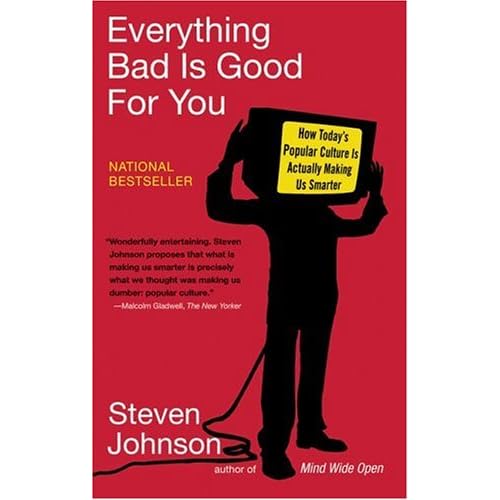
I went to a bachelor party last week and found myself tearing through all of Everything Bad Is Good for You during my travels - it seemed an appropriate way to start the weekend. Steven Johnson is becoming one of my favorite authors having loved both Emergence and The Invention of Air. But given the title, I had low expectations for this one - it seemed like a title designed to stir up controversy and sell some books. And in some ways it was. But, again his clear style and systemic perspective won me over, and I was sold.
The premise pretty straight-forward: common wisdom is that popular culture is dumbing down society as sex, violence, gossip, and other such trashy themes become more common in TV shows, movies, and video games. Johnson turns that idea on its head, by pointing out that most shows, movies, and games have gotten increasingly complex and smart - referencing the likes of Lost, The West Wing, The Usual Suspects, Memento, Adaptation, SimCity, and even Grand Theft Auto - and analyzing what he calls the Sleeper Curve (derived from Woody Allen's Sleeper where a future society discovers that junk food is actually healthy).
Technology drives this curve in large part - things like TiVo and DVD sales allow for more complex story lines and subtle jokes because people don't have to catch everything in real time. This has led a shift from "Least Objectionable Programming" where bland, easy to understand themes rule, to "Most Repeatable Programming" where complexity and subtley rule (if you're going to buy a DVD you want to know it won'g grow stale after one viewing - and you're going to pick Seinfeld over Three's Company).
I won't spoil the book too much, as it's a good, quick read - but for me the important, and hopeful take-away from this book is that our generation of gamers, Sopranos watchers, and Facebook users are training our minds to deal with complexity - and that is exactly what we need when we confront the sustainability challenge. For the masses of us who aren't supergeniouses, but can see what's going on around us, we are increasingly aware of and in tune with the implications of our actions in a complex system - burning oil here can cause droughts there that can cause famines, unrest, and war, and disrupt trade, displace refugees, and require us to send soldiers to far off lands - multiple story lines, delayed cause and effect, complexity - all things we need to understand to create a sustaianble society, and all things that are increasingly common in pop culture.
Not to say that playing video games is going to save the day - but an interesting perspective to challenge some commonly held assumptions. I'm still looking for the parallel that shows how bachelor parties are good for you... Stay going.
No comments:
Post a Comment